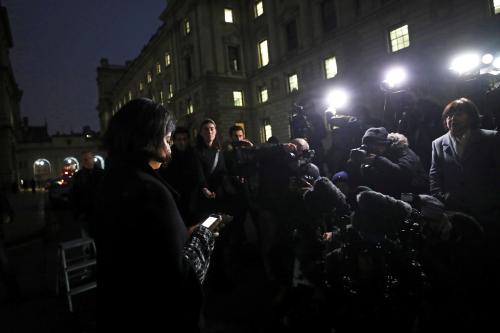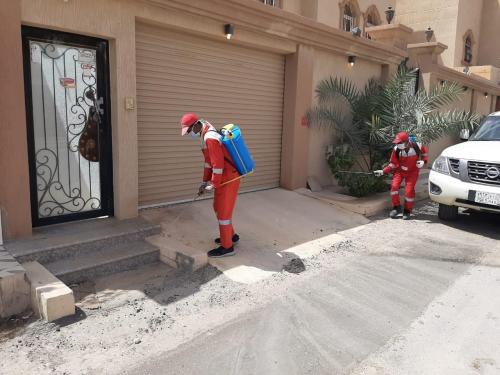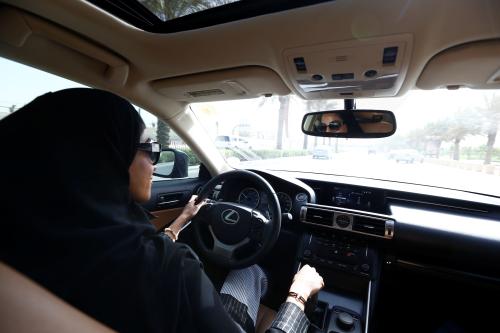Content from the Brookings Doha Center is now archived. In September 2021, after 14 years of impactful partnership, Brookings and the Brookings Doha Center announced that they were ending their affiliation. The Brookings Doha Center is now the Middle East Council on Global Affairs, a separate public policy institution based in Qatar.
Bahrain threatens to target critical social media users
On Sunday, March 25, Bahrain’s Interior Minister Sheikh Rashid bin Abdullah al-Khalifa said that the country is tracking down and taking legal action against social media users that speak against the Bahraini government. The Gulf nation continues to target human rights proponents by stating that they are ‘sowing chaos’ and having negative effects on society and the nation.
Social media websites such as Twitter have been a popular way to rally activists and opposition figures against the government. Exiled Bahraini activist, Sayed Ahmed AlWadaei, director of the UK-based Bahrain Institute for Rights and Democracy (BIRD), has been speaking up on how Bahraini authorities are targeting human rights activists and opposition figures, as well the families of the aforementioned as a tool of intimidation. Many of AlWadaei’s family members have been targeted by the Bahraini authorities.
Qatari emir visits Russia to discuss Syrian crisis
Qatar’s leader, Sheikh Tamim bin Hamad Al Thani arrived in Moscow on Sunday, March 25, and met President Vladmir Putin on Monday to discuss the situations in Syria, Yemen, and Palestine. The leaders discussed a multitude of topics, notably, Russia’s support for Bashar al-Assad’s forces, Qatari support for the opposition, and the possible participation of Qatar in post-conflict reconstruction of Syria.
The two leaders also discussed ways in which the two countries are planning on increasing cooperation and bolstering ties, particularly through trade and investment. One of the deals that has recently been announced is that Qatar Airways is set to buy a 25 percent share in Russia’s Vnukovo International Airport, one of the four major airports which serves the capital, Moscow.
Saudi Arabia: Houthi missile attack kills Egyptian in Riyadh
On Monday, March 26, Saudi authorities announced they had intercepted seven ballistic missiles fired by Houthi rebels, three of which were headed towards Riyadh and five of which were headed towards the southern Saudi cities of Abha, Jizan and Najran. Colonel Turki al-Maliki also said that an Egyptian resident was killed as a result of shrapnel, while several others were injured. This attack highlights how the war in Yemen has been increasingly spilling over the borders.
However, missile experts have questioned these claims about interception. Analysts such as Jeffrey Lewis, a missile expert at the Middlebury Institute of International Studies in Monterey, California, who has previously studied other Saudi Patriot missile launches, questioned the US Patriot defense system’s suitability for intercepting missiles such as those fired by Houthis in Yemen. Defense analysts say the Royal Saudi Air Defense Forces largely rely missiles that are designed to intercept slower, shorter-range, non-separating ballistic missiles, while the Houthis are launching faster, long-range, separating ballistic missiles.
Abu Dhabi and Qatar renew Al-Bunduq oil deal
Qatar Petroleum has renewed its contract with Abu Dhabi to continue operating a shared offshore oilfield, amidst the blockade against Qatar. The Bunduq Company, which operates Al-Bunduq field, is a Japanese-owned company.
Following this news on Tuesday, the United Arab Emirates (UAE) Supreme Petroleum Council issued a statement denying Abu Dhabi’s role in reaching the agreement with Qatar Petroleum. “Al-Bunduq oilfield is shared equally by the emirate of Abu Dhabi and Qatar due to its geographic location. It has been under management by a Japanese consortium for the past four decades,” according to a statement published by the UAE state news agency WAM. “This concession was recently extended by each respective government to the Japanese consortium with no direct communication or engagement between the two states. There is no commercial or trading relationship being established between the UAE and Qatar by the extension of this concession.”
Mohammad Bin Salman visits the United States of America
Saudi Arabia’s crown prince, Mohammad Bin Salman visited the United States, arriving in Washington on Monday, March 19. The Saudi leader met political and business leaders in Washington, New York, Silicon Valley and elsewhere, on a two-week tour across the country. According to Nader Hashemi, director of the Center for Middle East Studies at the University of Denver’s Josef Korbel School of International Studies, the main goal of the visit was to show a positive image of Saudi Arabia to the US public.
Due to the global slump in oil prices, Bin Salman revealed a plan last year of weaning Saudi Arabia off of its dependency on oil. One of the ways to do this was to build strong ties to important US business leaders, including those in finance and technology.
In their meeting at the White House, President Trump said that he hoped the Saudi crown prince would share his country’s wealth with the US, stating that he hopes the wealth would be shared “in the form of jobs, in the form of the purchase of the finest military equipment anywhere in the world.”
The US president also asked the prince to find a solution to the Gulf crisis with Qatar.
QATAR DENIES FRESH UAE ACCUSATIONS OF AIRSPACE VIOLATIONS
On Monday, March 26, the UAE accused Qatar of intercepting two of the its passenger flights flying over Bahraini airspace. The UAE’s General Civil Aviation Authority said that two Qatari fighter jets had “dangerously approached” two UAE-registered commercial aircrafts. According to UAE state agency, WAM, one of the aircrafts was forced to “do an emergency manoeuver to avoid colliding with the Qatari jets”.
Qatar has denied these accusations and stated that this is an attempt to cover up the UAE’s multiple breaches of Qatari airspace, while also confirming the country’s commitment to the highest international aviation quality and safety standards.









Commentary
GCC News Roundup: Bahrain targets social media users, Qatari emir visits Russia, Houthi missile attack in Saudi Arabia (March 1- 31)
April 1, 2018